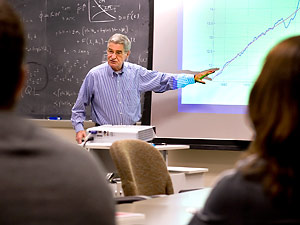Return to: U of M Home

A student's account of meeting economics Nobel laureates with differing views

Nobelist Robert Lucas addresses U of M economics students at the
Federal Reserve Bank of Minneapolis. Home page images show Edward
Prescott.
Photos: Patrick O'Leary
By Philip Zeller
In the midst of the
greatest recession my generation has experienced, the chance to study
under a world-renowned expert on depressions and financial crises is,
for an undergraduate, tremendous. That is what professor Tim Kehoe gave 26 aspiring economists in his course on depressions and financial crises.
On the first day of lecture, Kehoe declared the course should be the
most important part of the students' lives. The students worked with
data and analytical models (many developed by Kehoe's colleagues) to
determine the causes of significant economic downturns and, hopefully,
recoveries. The class, though rigorous and time-consuming, has been
worthwhile.
The students used Great Depressions of the Twentieth Century,
co-edited by Kehoe and Nobel laureate Edward Prescott, as their primary
text. In mid-October, Kehoe told his students they would take a field
trip to the Federal Reserve Bank of Minneapolis, where Kehoe is an
adviser, to attend a presentation by Prescott and fellow Nobel laureate
Robert Lucas.
A live subject
"The current financial crisis has been tragic for many people, but it
gives me as an economics professor the opportunity to show my students
that economics is a very live subject, with a major impact on the world
around us and on them personally."—Tim Kehoe, Distinguished McKnight
University Professor of Economics.
The class was giddy at the
prospect. These economists are ranked fifth and 10th, respectively, in
the IDEAS ranking of economists, a system based on quantity and quality
of published economics research.
On Tuesday, November 10,
the class headed to "the Fed." Prescott and Lucas gave brief overviews
of their recent research, and then took questions from the students.
Great minds think unalike
It struck me that two men of similar education and work backgrounds,
both with tremendous accolades in economics, could present vastly
different solutions to economic meltdowns.
A free market
economist and outspoken political conservative, Prescott boldly stated,
"Economic stimulus is really an economic depressant." In stark
contrast, the more interventionist Lucas attributed the length of the
great depression partially to the noninterventionist and
anti-immigration policy of the Hoover administration. While the
gentlemen were entirely cordial and friendly, they clearly have
significant professional disagreements.
Afterward, I asked
Prescott for his thoughts on the green movement and its effect on
technological progress, productivity, and economic growth. He said that
while he doesn't question the negative impact of greenhouse gases, and
he is confident the green movement can lead to technological growth, he
worries that the movement could lead to a technological retrogression,
conceivably slowing economic growth.
The
chance to candidly chat with Nobel laureates is certainly one I would,
in all likelihood, have never had at the other schools where I studied
before attending the University of Minnesota.